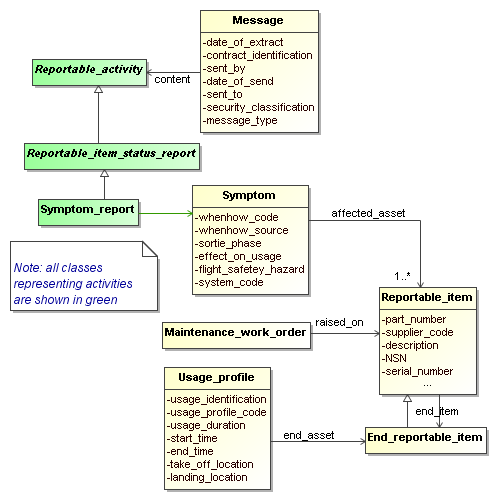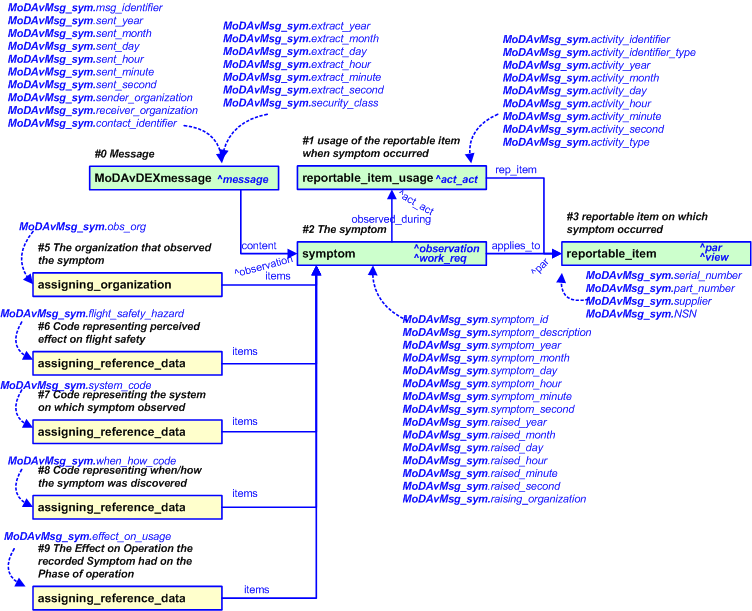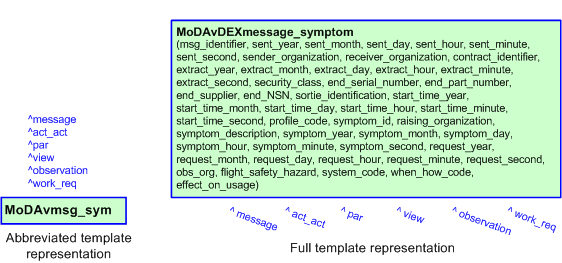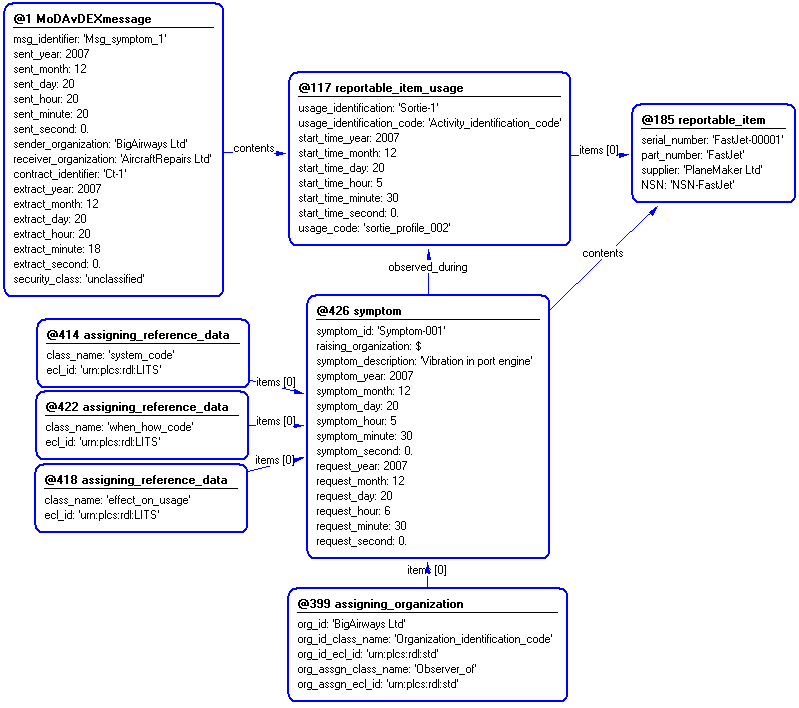Template:— MoDAvDEXmessage_symptom (MoDAvmsg_sym)
Context:— MoDAvDEX |
Date: 2008/02/03 21:24:01
Revision: 1.10
|
This section specifies the template MoDAvDEXmessage_symptom.
NOTE
The template has been defined in the context of
MoDAvDEX.
Refer to the business context for details of related templates.
NOTE
An explanation of a template and the associated instantiation path is
provided in the
Template overview
section.
This template describes how to represent a message reporting a symptom.
Symptom messages represent a record of a symptom that has been identified and reported against a
reportable item.
The EXPRESS-G diagram in
Figure
2
shows the templates and EXPRESS entities that are required
to represent the template
"MoDAvDEXmessage_symptom".
The text highlighted in blue shows the template parameters.
Figure 2 — An EXPRESS-G representation of the Information model for MoDAvDEXmessage_symptom
The graphic for the template to be used in other EXPRESS-G diagrams
is shown in Figure
3
below.
Figure 3 — The graphical representation of the MoDAvDEXmessage_symptom template
The following input parameters are defined for this template:
The identifier of the message.
Calendar_date year_component of the date that the message was sent.
Calendar_date month_component of the date that the message was sent.
Calendar_date day_component of the date that the message was sent.
Local_time hour_component of the date and time that the message was sent.
Local_time minute_component of the date and time that the message was sent. This
parameter is optional. If not given, it will remain unset.
Local_time second_component of the date and time that the message was sent. This
parameter is optional. If not given, it will remain unset.
The name or identifier of the sending organization.
The name or identifier of the receiving organization.
The name or identifier of the contract.
Calendar_date year_component of the date that the information in the message was
extracted from the sending system.
Calendar_date month_component of the date that the information in the message
was extracted from the sending system.
Calendar_date day_component of the date that the information in the message was
extracted from the sending system.
Local_time hour_component of the date that the information in the message was
extracted from the sending system.
Local_time minute_component of the date that the information in the message was
extracted from the sending system. This parameter is optional. If not given, it will remain
unset.
Local_time day_component of the date and time the message is extracted. This
parameter is optional. If not given, it will remain unset.
The following classes and their sub-classes can be used:
classifications: [ModAvDEX_Security_classification]![[warning:]](../../../../../../images/dex/warning.gif) Error RDL4: The URI urn:plcs:rdl:LITS is not listed in dexlib/data/refdata/rdl_index.xml
Error RDL4: The URI urn:plcs:rdl:LITS is not listed in dexlib/data/refdata/rdl_index.xml
The serial_number of the reportable item that undertook the activity.
The part_number of the reportable item that undertook the activity.
The supplier of the reportable item that undertook the activity.
end_NSN (Default=/NULL,Type='STRING', Optional)
The NSN of the reportable item that undertook the activity.
The identifier of the activity.
Calendar_date year_component of the date the activity was started.
Calendar_date month_component of the date the activity was started.
Calendar_date day_component of the date the activity was started.
Local_time hour_component of the date and time the date the activity was started.
Local_time minute_component of the date and time the activity started.
This parameter is optional. If not given, it will remain unset.
Local_time second_component of the date and time the activity was started.
This parameter is optional. If not given, it will remain unset.
The identification of the type of sortie activity.
The following classes and their sub-classes can be used:
An identification for the symptom.
The organization raising the symptom
A textual description of the symptom
Calendar_date year_component. The year the symptom was identified.
Calendar_date month_component. The month the symptom was identified.
Calendar_date day_component. The day the symptom was identified.
Local_time hour_component of the date and time. The hour the symptom was identified.
Local_time minute_component of the date and time. The minute the symptom was identified.
This parameter is optional. If not given, it will remain unset.
Local_time second_component of the date and time. The second the symptom was identified.
This parameter is optional. If not given, it will remain unset.
Calendar_date year_component. The year a request to address the symptom was raised .
Calendar_date month_component. The month a request to address the symptom was raised .
Calendar_date day_component. The day a request to address the symptom was raised .
Local_time hour_component of the date and time. The hour a request to address the symptom was raised .
Local_time minute_component of the date and time. The minute a request to address the symptom was raised .
This parameter is optional. If not given, it will remain unset.
Local_time second_component of the date and time. The second a request to address the symptom was raised .
This parameter is optional. If not given, it will remain unset.
The organization that identified the symptom.
A code for the perceived effect that the symptom had on flight safety.
The following classes and their sub-classes can be used:
A code for the system on which the symptom was manifested.
The following classes and their sub-classes can be used:
Code representing "When/How" the symptom was discovered
The following classes and their sub-classes can be used:
The Effect on Operation the recorded Symptom had on the Phase of operation (e.g. sortie).
The following classes and their sub-classes can be used:
The following reference parameters are defined for this template:
Allow the
Message
entity instantiated in this path to be referenced when this template is used.
Note: The
Message
entity can be referenced in a template path by:
%^target = $MoDAvDEXmessage_symptom.message%
where
target
is the parameter to which the
Message
is bound.
Allow the
Activity_actual
entity instantiated in this path to be referenced when this template is used.
%^target = $MoDAvDEXmessage_symptom.act_act%
Allow the
Product_as_realized
entity instantiated in this path to be referenced when this template is used.
%^target = $MoDAvDEXmessage_symptom.par%
%^target = $MoDAvDEXmessage_symptom.view%
Allow the
Observation
entity instantiated in this path to be referenced when this template is used.
Note: The
Observation
entity can be referenced in a template path by:
%^target = $MoDAvDEXmessage_symptom.observation%
where
target
is the parameter to which the
Observation
is bound.
Allow the
Work_request
entity instantiated in this path to be referenced when this template is used.
Note: The
Work_request
entity can be referenced in a template path by:
%^target = $MoDAvDEXmessage_symptom.work_req%
where
target
is the parameter to which the
Work_request
is bound.
The instantiation path shown below specifies the entities that are to be
instantiated by the template.
A description of templates and the syntax for the instantiation path is
provided in the
Templates Help/Information section.
-- Instantiate the reportable item /
reportable_item(
serial_number=@end_serial_number,
part_number=@end_part_number,
supplier=@end_supplier,
NSN=@end_NSN)/
%^par = $reportable_item.par%
%^view = $reportable_item.view%
/
reportable_item_usage(
usage_identification=@sortie_identification,
usage_identification_code='Activity_identification_code',
start_time_year=@start_time_year,
start_time_month=@start_time_month,
start_time_day=@start_time_day,
start_time_hour=@start_time_hour,
start_time_minute=@start_time_minute,
start_time_second=@start_time_second,
usage_code=@profile_code,
rep_item=^par)/
%^act_act = $reportable_item_usage.act_act%
/
symptom(
symptom_id=@symptom_id,
raising_organization=@raising_organization,
symptom_description=@symptom_description,
symptom_year=@symptom_year,
symptom_month=@symptom_month,
symptom_day=@symptom_day,
symptom_hour=@symptom_hour,
symptom_minute=@symptom_minute,
symptom_second=@symptom_second,
request_year=@request_year,
request_month=@request_month,
request_day=@request_day,
request_hour=@request_hour,
request_minute=@request_minute,
request_second=@request_second,
observed_during=^act_act,
applies_to=^par)/
%^observation = $symptom.observation%
%^work_req = $symptom.work_req%
/
MoDAvDEXmessage(
msg_identifier=@msg_identifier,
sent_year=@sent_year,
sent_month=@sent_month,
sent_day=@sent_day,
sent_hour=@sent_hour,
sent_minute=@sent_minute,
sent_second=@sent_second,
sender_organization=@sender_organization,
receiver_organization=@receiver_organization,
contract_identifier=@contract_identifier,
extract_year=@extract_year,
extract_month=@extract_month,
extract_day=@extract_day,
extract_hour=@extract_hour,
extract_minute=@extract_minute,
extract_second=@extract_second,
security_class=@security_class,
content=^observation)/
%^message = $MoDAvDEXmessage.message%
/
assigning_organization(
org_id=@raising_organization,
org_id_class_name='Organization_identification_code',
org_id_ecl_id='urn:plcs:rdl:std',
org_assgn_class_name='Requestor_of',
org_assgn_ecl_id='urn:plcs:rdl:std',
items=^observation)/
/
assigning_reference_data(
class_name=@flight_safety_hazard,
ecl_id='urn:plcs:rdl:LITS',
items=^observation)/
/
assigning_reference_data(
class_name=@when_how_code,
ecl_id='urn:plcs:rdl:LITS',
items=^observation)/
/
assigning_reference_data(
class_name=@system_code,
ecl_id='urn:plcs:rdl:LITS',
items=^observation)/
/
assigning_reference_data(
class_name=@effect_on_usage,
ecl_id='urn:plcs:rdl:LITS',
items=^observation)/
The instance diagram in Figure
4
shows an example of the EXPRESS entities and templates that are instantiated by the template:
Figure 4 — Entities instantiated by MoDAvDEXmessage_symptom template
Characterizations
No common characterizations of the template
MoDAvDEXmessage_symptom
have been identified. However, the ISO 10303-239 EXPRESS model
may enable other assignments to the entities instantiated by the template.



